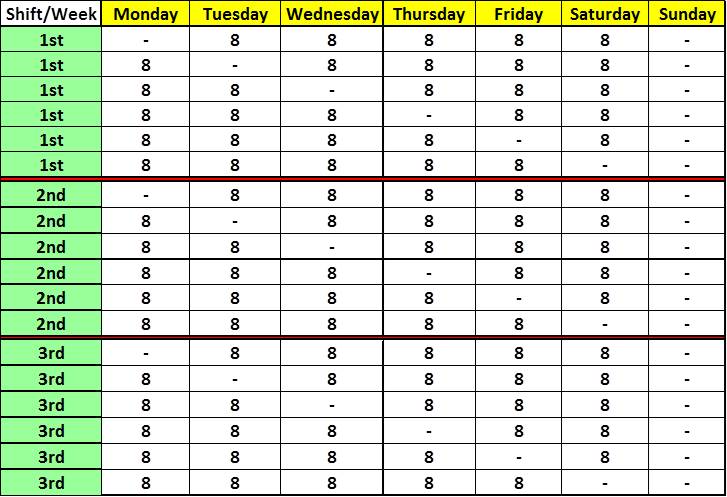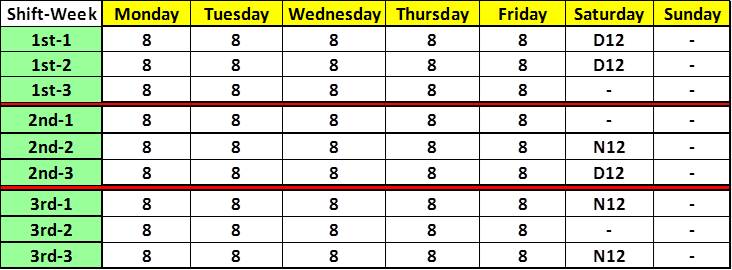A Few Words About Rotating and Fixed shifts
What is the difference between fixed and rotating schedules as well as any other type of schedule?
What is the difference between fixed and rotating schedules as well as any other type of schedule?
This is the fourth and final post in a series of four posts regarding 6-day schedules. Here are the links to 6-day schedules (part 1), 6-day schedules (part 2) and 6-day schedules (part 3).
In this post, we will look at two extremes when it comes to covering 6 days. One uses extra staffing to cover 6 days with 40-hour workweeks. The other uses traditional staffing for a 48-hour workweek but has a few 12-hour shifts to give an occasional weekend off.
First, let’s consider a schedule that covers 6 days with 40-hour workweeks. This is more complicated than you might think. Why? Well, there are 144 hours in a 6-day period. If a crew is worth 40 hours, then you would need 3.6 crews to provide coverage (144/40=3.6).
This is accomplished by having each of your three 8-hour crews being 20% larger than the number of people you expect to show up each day. In this way, one out of every 6 people can be off on any given day (except Sunday when everyone is off).
Here is what the schedule looks like:
 You will notice that to have 5 people show up on any given day, you need to have 6 people assigned with one of those 6 being off on that day.
You will notice that to have 5 people show up on any given day, you need to have 6 people assigned with one of those 6 being off on that day.
First, the good news about this schedule. Everyone gets Sunday off plus one other day that week. This should increase alertness (compared to the alternative of only getting Sunday off and no others during the week). That’s about it as far as the good news goes.
There are several problems:
Onward…
This next schedule is an attempt to keep things simple and yet, still, give the employees a full weekend off once every three weeks. “Keeping things simple” basically says, work everyone for 6 days in a row, all 8-hour shifts. The workforce might not like this. Alertness, safety, and productivity will suffer; but it’s “simple.”
Now to get a full weekend off with the smallest departure from “simple” you must work 12-hour shifts on two out of every three weekends. The third weekend is off.
Here is the schedule:
 This schedule is only popular among those that place a very high value on full weekends off. Working 6 days in a row is hard enough. This schedule not only calls for that, but it makes one of those 6 days, a 12-hour day. The result is a full weekend off once every three weeks.
This schedule is only popular among those that place a very high value on full weekends off. Working 6 days in a row is hard enough. This schedule not only calls for that, but it makes one of those 6 days, a 12-hour day. The result is a full weekend off once every three weeks.
This is probably not a sustainable schedule for more workplaces. However, in the short run, it may be just what you need.
Call Us and We Can Help
Call or text us today at (415) 763-5005 to discuss your operations and how we can help you solve your shift work problems. You can also complete our contact form and we will call you.